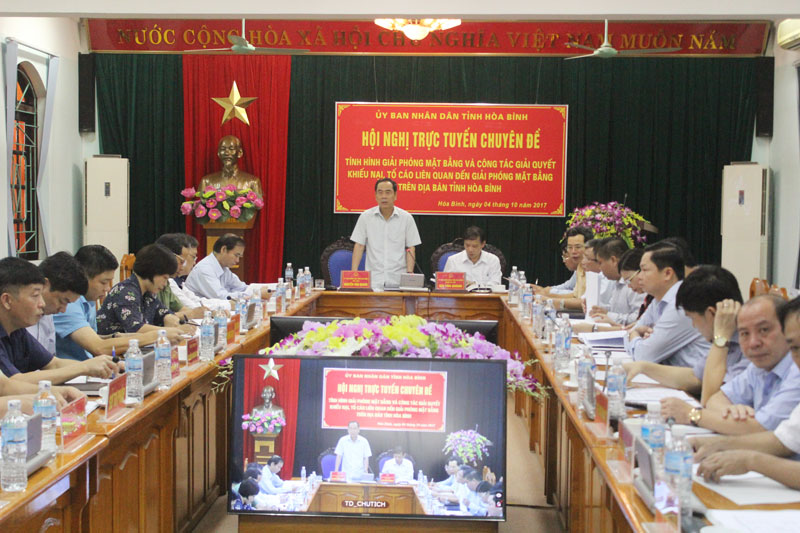
(HBO) – Vice Secretary of the Party Committee and Chairman of the People’s Committee of Hoa Binh province Nguyen Van Quang has chaired a teleconference on site clearance and settlement of complaints relating to land seizure, site clearance and resettlement support in the locality.
Chairman
of the provincial People’s Committee Nguyen Van Quang speaks at the conference.
Since 2014, Hoa Binh province has finished
compensation and site clearance for 289 projects covering 549.4ha of land.
About 818.66 billion VND (over 36 million USD) has been spent on compensating
and assisting 12,099 households whose land revoked to resettle. Site clearance
is being conducted for about 60 projects across the province, expecting to
withdraw around 310.6ha of land.
Provincial authorities have directed sectors and
local administrations to handle obstacles in compensating owners of seized land
and site clearance in key and complicated projects such as Hoa Lac – Hoa Binh
road and Road No. 21 traversing Kim Boi and Lac Thuy districts. However, the
progress of site clearance for some projects remains sluggish.
Since 2014, the boards for citizen reception at
all levels have met 1,677 delegations with 2,745 people who came to submit
complaints, denunciations and opinions about 1,898 cases, 1,229 cases of which
related to land management, compensation for seized land, and support during
land seizure. The boards handled 1,953 petitions of all kinds, including 1,444
ones relevant to land and site clearance.
Concluding the meeting, Chairman of the
provincial People’s Committee Nguyen Van Quang stressed that the smooth
implementation of site clearance will help reduce complaints and denunciations
while attracting investment and boosting socio-economic development.
To solve bottlenecks and shortcomings in site
clearance and complaint settlement, it is necessary to improve the leadership
capacity of Party committees and administrations and bring into play the role
of organisations in raising local residents’ awareness of law observance.
Quang underlined the need to promote advisory
bodies’ capacity to serve the issuance of compensation and resettlement support
regulations, enhance coordination in site clearance among authorized agencies
and localities, and thoroughly deal with related problems, especially in key
projects.
He also asked for transparent land planning,
land seizure and compensation, along with examination and strict punishment of
violators or persons inciting others to violate regulations./.
On May 15, the Hoa Binh Steering Committee for Science, Technology, Innovation, and Digital Transformation launched the "Digital Literacy for All” movement. The event was held both in-person and virtually, connecting provincial authorities with district-level Party committees and local communities across communes, wards, and townships.
The People’s Committee of Hoa Binh province on May 16 held a conference to honour outstanding intellectuals for their contributions in 2025.
The Standing Board of the Hoa Binh provincial Party Committee has held a conference to announce the provincial Party Committee’s decision about the merger of Hoa Binh Newspaper and the provincial Radio and Television Station, along with the Standing Board’s appointment decisions.
After the historic victory on April 30, 1975, which liberated the South and reunified the country, the whole Vietnam embarked on a new mission — promoting peace and reconstructing the nation with century-defining projects. On the fierce Da River, over 30,000 engineers, sappers, and construction workers battled against rocky mountains and raging floods to achieve a remarkable feat. The Hoa Binh Hydropower Plant, the largest of its kind in Southeast Asia at that time, officially began generating electricity, lighting up the North and ushering in a new era of industrialisation.
Muong Dong in Kim Boi district, one of the four major Muong regions in Hoa Binh province, is harnessing its revolutionary legacy and cultural heritage to drive socio-economic transformation.
Throughout April, the joyful atmosphere of the 50th anniversary of the Liberation of the South and National Reunification spread nationwide. Together with the whole country, residents in Hoa Binh city also expressed their patriotism through meaningful and practical actions.



